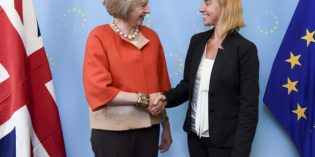Author Archive: Democratic Audit UK

Open Letter to Jeremy Corbyn: Grassroots movements have a place, but they are not the key task of parliamentary opposition
As Labour gears up for another leadership contest, Anne Power makes an appeal to Jeremy Corbyn to stand down as leader of the opposition. She writes that although she respects him as a good local MP, his divisiveness in the PLP and weak performance during the Brexit campaign indicate he is unsuited to leading the […]

The EU referendum and some paradoxes of democratic legitimacy
Referendums are potentially destabilising in parliamentary democracies because they generate alternative, competing sources of legitimacy, writes Nat le Roux. A majority of elected representatives may hold one view on a matter of national importance, and if a referendum demonstrates that a majority of the public hold the opposite view, which manifestation of democratic legitimacy should […]

The Brexit paradox: Direct democracy is a flawed route to reviving sovereignty
Rhetoric around parliamentary sovereignty and “taking back control” became a recurring theme in the Leave Campaign. But Panagiotis Doudonis argues that there is a contradiction in using a referendum – a coercive, direct democracy device – to reclaim parliamentary sovereignty, which has its foundations in representative democracy. Similar PostsLong Read: Brexit, the Referendum and the […]

The takeover: Prime Ministers without a popular mandate 1916-2016
There are more or less two routes to becoming Prime Minister. You can either win a General Election or win a party leadership election to become head of the largest party when a Prime Minister leaves. Having just achieved the second route, Theresa May has become our ‘takeover’ leader. Here, Ben Worthy discusses the history […]

What do the Tory grassroots want from Prime Minister Theresa May?
Andrea Leadsom’s withdrawal from the Conservative race took the final leadership decision out of the membership’s hands. In the absence of a vote, Paul Webb, Monica Poletti and Tim Bale draw on a recent survey to reveal the composition and attitudes of Tory supporters, as well as their views on the party’s leadership. Similar Posts

Labour’s century-old problem: Leadership performance
Party leadership requires rhetorical performance – but the Labour party has broader issues with leadership: it doesn’t understand it, writes John Gaffney. Those challenging Corbyn must therefore grapple with questions of what leadership entails, what the relationship(s) between leader and the parliamentary party, the electorate, and the media should be – not least because the […]

When anti-Islamic protest ends: Explaining the decline of the English Defence League
There are been multiple studies exploring the rise and fall of the English Defence League, which attribute failure to factors including the lack of vision, internal infighting and the state’s responses. William Allchorn argues that although these explanations are useful, they fail to acknowledge how changes in the external political and security environment may have […]

Book Review: Politics against Domination by Ian Shapiro
In Politics against Domination, Ian Shapiro proposes non-domination as the guiding value for justice, argues that it is best supported by democracy and speculates about measures to realise it across borders. Shapiro evidences his insight and wisdom as a renowned political theorist in this account, but the work may not fully convince those who view non-domination […]

Why there should be a general election before Article 50 is triggered
The Conservative Party is currently selecting a new leader who is expected to trigger Article 50 and begin the process of the UK leaving the European Union. Kenneth Armstrong writes that as the UK will need to set out what sort of new relationship it wants with the EU, there is a clear case for an […]




 Democratic Audit's core funding is provided by the Joseph Rowntree Charitable Trust. Additional funding is provided by the London School of Economics.
Democratic Audit's core funding is provided by the Joseph Rowntree Charitable Trust. Additional funding is provided by the London School of Economics.